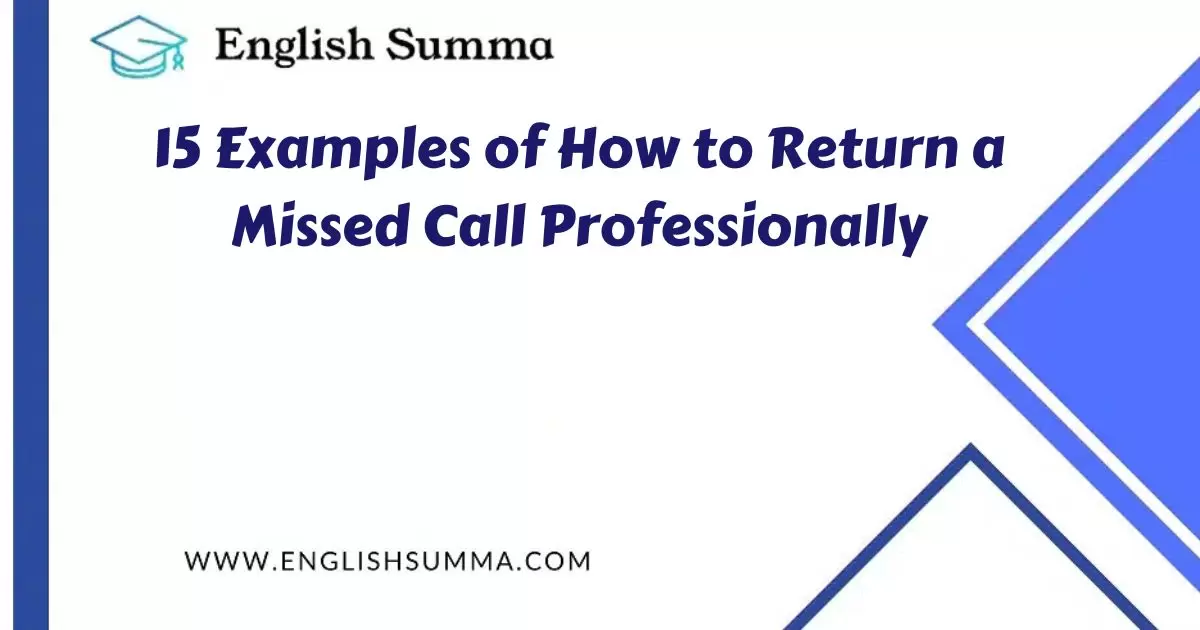1. “Sorry, I Noticed I Missed Your Call”
Dear Justin,
I hope this email finds you well. Sorry, I noticed I missed your call earlier today. I was in a meeting and couldn’t answer the phone. How can I assist you now?
Best regards,
James Wilson
Additional Tip: Expressing regret and acknowledging the missed call promptly shows respect for the caller’s time.
2. “Thank You for Your Call Earlier”
Dear Justin,
Thank you for your call earlier. I apologize for not being able to answer at the time. How may I help you now?
Warm regards,
James Wilson
Additional Tip: Express gratitude for the caller’s attempt to reach out, even if you couldn’t respond immediately.
3. “I’m Sorry I Couldn’t Answer Your Call Earlier”
Dear Justin,
I hope this email finds you well. I’m sorry I couldn’t answer your call earlier. I was in a client meeting. How can I assist you now?
Best regards,
James Wilson
Additional Tip: Providing a brief explanation for missing the call helps set context and shows respect for the caller’s inquiry.
4. “I Apologize for Missing Your Call. What Can I Do for You?”
Dear Justin,
My apologies for missing your call earlier. I apologize for missing your call. What can I do for you?
Looking forward to assisting you,
James Wilson
Additional Tip: Offering assistance immediately after apologizing demonstrates readiness to address the caller’s needs.
5. “I’m Returning Your Call. How Can I Be of Service?”
Dear Justin,
I hope you’re doing well. I’m returning your call. How can I be of service?
Best regards,
James Wilson
Additional Tip: Directly stating that you’re returning the call helps clarify your intention and facilitates efficient communication.
Don’t miss read out this : Synonyms for “Let Me Know if You Are Interested”
6. “I’m Sorry I Was Too Busy to Take Your Call Earlier”
Dear Justin,
I trust you’re having a great day. I’m sorry I was too busy to take your call earlier. Please let me know how I can assist you now.
Warm regards,
James Wilson
Additional Tip: Acknowledging busyness communicates honesty and transparency, fostering understanding from the caller.
7. “I Must Have Missed Your Call Earlier Today”
Dear Justin,
I hope this message finds you well. I must have missed your call earlier today. Please let me know how I can help you now.
Best regards,
James Wilson
Additional Tip: Using phrases like “must have” conveys a sense of accountability while remaining polite.
8. “I’m Here Now to Assist with Anything You Need”
Dear Justin,
I hope you’re doing well. I’m here now to assist with anything you need. Feel free to reach out at your convenience.
Best regards,
James Wilson
Additional Tip: Offering ongoing assistance reinforces your availability and willingness to help beyond the missed call.
9. “Please Accept My Apologies for Missing Your Call”
Dear Justin,
I hope this email finds you well. Please accept my apologies for missing your call earlier today. How may I assist you now?
Warm regards,
James Wilson
Additional Tip: A formal apology demonstrates sincerity and respect for the caller’s attempt to communicate.
10. “Give Me a Few Days to Learn More”
Dear Justin,
Thank you for your recent call. Give me a few days to learn more about your inquiry, and I’ll get back to you with comprehensive assistance.
Best regards,
James Wilson
Additional Tip: If you need time to gather information or research, communicate your plan to follow up within a reasonable timeframe.
11. “I’m Available Now. Let’s Connect!”
Dear Justin,
I hope you’re doing well. I’m available now and ready to connect. Feel free to give me a call back, and we can discuss whatever you need assistance with.
Best regards,
James Wilson
Additional Tip: Offering immediate availability shows responsiveness and eagerness to address the caller’s needs promptly.
12. “Sorry for the Miss. Can We Reschedule?”
Dear Justin,
Apologies for missing your call earlier. Sorry for the miss. Can we reschedule? Let me know a convenient time for you, and I’ll make sure to be available.
Best regards,
James Wilson
Additional Tip: Proposing a reschedule demonstrates flexibility and commitment to ensuring effective communication.
13. “Thanks for Your Call. How Can I Assist?”
Dear Justin,
Thank you for reaching out. Thanks for your call. How can I assist you today? Feel free to let me know your requirements, and I’ll be happy to help.
Best regards,
James Wilson
Additional Tip: Expressing appreciation for the call fosters a positive rapport with the caller.
14. “Missed Your Call. Best Time to Reconnect?”
Dear Justin,
I hope this message finds you well. Missed your call. What’s the best time to reconnect? Let me know, and I’ll make sure to be available.
Warm regards,
James Wilson
Additional Tip: Promptly seeking a suitable time to reconnect demonstrates proactive communication and commitment to resolving the caller’s query.
15. “Couldn’t Answer, but Ready to Chat Now”
Dear Justin,
I trust you’re doing well. Couldn’t answer, but ready to chat now. Feel free to give me a call back, and we can discuss whatever you need assistance with.
Warm regards,
James Wilson
Additional Tip: Communicating readiness to engage in conversation signals availability and commitment to resolving the caller’s inquiry promptly.
Pros and Cons of Returning Missed Calls Professionally
Returning missed calls professionally offers several benefits, including:
- Maintaining Professionalism: It showcases your professionalism and respect for communication etiquette.
- Building Trust: Promptly addressing missed calls helps build trust and reliability with clients or colleagues.
- Efficient Communication: It facilitates efficient communication and resolves inquiries in a timely manner.
However, there are also potential drawbacks, such as:
- Time Constraints: Responding to missed calls promptly may require balancing other priorities.
- Misunderstandings: Despite your best efforts, misunderstandings or delays in communication may still occur.
- Expectation Setting: Consistently returning missed calls promptly may set high expectations for responsiveness.

